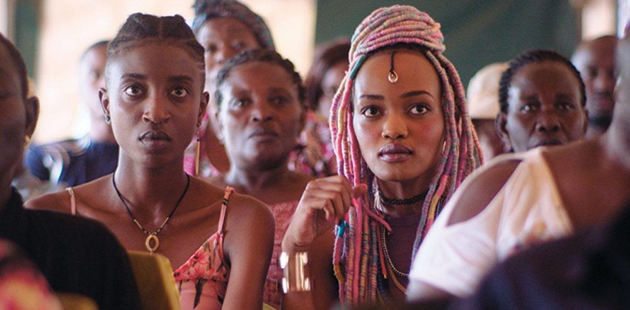 Power-pop-electro anthems follow exuberant schoolgirl Kena (Samantha Mugatsia) as she skateboards through the busy streets of Nairobi in the 2018 Kenyan-drama film Rafiki. The tempo of the music beating at the same speed as the people in the bustling streets. Her bravado is exceeded only by her partner Ziki (Sheila Munyiva), a girl much like the production design of Rafiki is adorned in bubblegum pink that acts as a message of self-expression against a society which forbids homosexual relationships.
Power-pop-electro anthems follow exuberant schoolgirl Kena (Samantha Mugatsia) as she skateboards through the busy streets of Nairobi in the 2018 Kenyan-drama film Rafiki. The tempo of the music beating at the same speed as the people in the bustling streets. Her bravado is exceeded only by her partner Ziki (Sheila Munyiva), a girl much like the production design of Rafiki is adorned in bubblegum pink that acts as a message of self-expression against a society which forbids homosexual relationships.
Nairobi is presented as a city of ideological contradictions. A city inundated by generational values that must compete with a progressive wave of change that challenges traditional thinking. The complexity of Kena and Ziki’s relationship is further tested by both girls’ fathers being political rivals in an upcoming election, with the fear of their relationship becoming public knowledge damaging to both of their fathers’ campaigns.
For Kena and Ziki, the charade of being ‘just’ friends (Rafiki meaning friend in Swahili) protects them from the oppression that is founded in religion, society and politics. Members of the community act as agents of gossip in Rafiki, with the notion of community standing and the deteriorating impact gossip has on the family unit – particularly that of women who are subject to harsher critiques – rigorously explored.
Wanuri Kahiu’s direction welcomes you to see Kena and Ziki from the other’s perspective with each observant gaze building towards a budding romance that never feels voyeuristic (beautiful and intimate moments within a van are a standout). Their growing affection is also supported in a pink colour palette that is present throughout the film (whether it be in the colour of buildings and the colour of the sky) and goes on to highlight progressiveness in Kenyan culture.
The slow build of Kena and Ziki’s romance makes their relationship feel earnt with the focus on their loving embraces further empowered by their bravery to do so under threat of a political climate that would see the two become isolated if not together.
Both Munyiva and Mugatsia are sublime in portraying young women who struggle with their sexual identity yet remain empowered by each-others presence as though separation would cause them pain. Their relationship progresses throughout the film, initially starting as secluded getaways where they dream of escape, to major realisations that the shame they feel for loving each other is unfounded.
Throughout their blossoming relationship, Kena and Ziki witness homophobia in both conscious and unconscious forms (on frequent occasions comments are made at Kena and her newfound happiness, with people suggesting it’s due to a man in her life) with Rafiki presenting this as equally reprehensible and something that in its wake draws the two young-women closer.
The escalating tension brought about by questions of how ‘real’ their relationship is are viscerally explored in the later parts of Rafiki and build towards many heartbreaking exchanges that draw upon the film’s conclusion.
Where western cinema is celebrated for an increasing slew of mainstream LGBTQI films, the bravery behind the release of Rafiki – all-the-more impressive seeing as the film is banned from playing in Kenya – is a testament to the importance of the film and the oppressive climate it exists within.
Rafiki screened as part of the 2019 Melbourne Queer Film Festival (MQFF). A special encore screening will take place tonight at the Jam Factory Cinemas (Monday 25 March – 8.30pm). For more information, visit: www.mqff.com.au for details.
Image: Samantha Mugatsia as Kena and Sheila Munyiva as Ziki in Rafiki (supplied)
Review: Hagan Osborne
